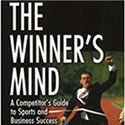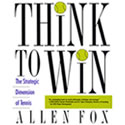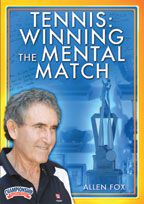Your Game Will Follow Your Emotions
 BOOK EXCERPT FROM “TENNIS: WINNING THE MENTAL MATCH”
BOOK EXCERPT FROM “TENNIS: WINNING THE MENTAL MATCH”
By Allen Fox, Ph.D. c 2010, all rights reserved
When you feel good, you are apt to play well; conversely, when you feel bad, you are likely to play poorly. Sport psychologists talk about the need to control emotion on court, but what they mean by this is not simply suppressing emotions (like anger or depression). They refer instead to an optimum strategy by which players not only rid themselves of negative emotions but also to create positive ones.
As an example of the power of emotion to affect athletic performance, consider the issue of home court advantage, which is mostly an emotional advantage. In the major professional sports leagues the home teams had the following winning percentages: baseball – 53% (1991-2002), hockey – 55% (1998-2003), football – 58% (2001-2005), and basketball – 61% (2001-2006). Many explanations have been offered including variations in days of rest, sleep, travel-fatigue, etc. but the most important factors seem to be largely emotional – familiarity with the playing field or court and the influence of the crowd. This is supported by noting that in the NBA the winning percentages for the home teams are usually greatest in the playoffs, where the crowds are larger and louder than they are during the regular season. These effects are obviously mostly psychological, since the size of the court, the height of the basket, and the bounce of the ball are the same as they were during the regular season, and are basically the same from arena to arena. The screaming support of the home fans effects the player’s emotions and helps the home team play better and the visitors play worse.
During tennis competition, as with the other sports, positive emotions help but do not guarantee good play. This fact tends to confuse players, because they often find that they still lose matches even after disciplining their emotions positively and well. So they start to think emotional control has no value. And they are dead wrong! Even though good emotions do not ever guarantee a victory, bad emotions often guarantee a loss. Emotions only set the stage for the quality of play that follows, but they don’t control it. Good emotions only make good play more likely; they don’t guarantee anything. Finally, emotional effects on tennis performance are often overlooked because they may be small, sometimes only a difference of a point or two here and there, which are hardly noticeable. (But these few points, in a close match, often make the difference between winning and losing.)
Habits, repetitions, and our strokes: Our strokes are controlled by sequences of muscle memories that are programmed into the nervous system through repetition in practice. The more correct repetitions, the more accurate the programming and the more likely the stroke is to function properly in competition. Optimal tactical responses to an opponent’s shots during play are also programmed into our nervous systems by reward and punishment during past competition. For example, when we hit the right shot and win the point and, in the same situation, hit the wrong shot and lose the point, our nervous systems record this information and use it later to improve shot selection. Eventually the strokes and immediate tactical responses are no longer under conscious control in matches. They function by habit and come out too quickly for conscious thought. Of course at the conscious level we need to have game plans and remain sensitive to how well they are working in order to make effective adjustments, but this is all superimposed upon the set of basic programmed habits and responses that function below the level of conscious thought.
Now for the punch line: these habits and programmed responses are substantially affected by strong emotion. They are disrupted by negative emotions (and negative thought processes that ultimately produce negative emotions) like anger, depression, fear, and pessimism. On the other hand, they are helped by positive emotions (and positive thought processes that ultimately produce positive emotions) like optimism, controlled aggression, feelings of confidence, strength and courage, and optimal levels of arousal. Even when the effects are small they often make the difference between victory and defeat.
Don’t let your emotions be controlled by what is happening on court. In competition, the top pros spend most of their time between points striving to eliminate negative emotions and create positive ones. This requires an emotional plan and the discipline to implement it regardless of negative events that may occur during match play. The less successful players allow their emotions to be determined by what is happening on court. This is an unstable and circular situation in that their emotions are controlled by events (which are out of their control) rather than by themselves. Here bad play produces bad emotions which in turn produce further bad play. The trick in maximizing performance and reducing its variability is for the player to produce positive emotions before every point, independent of what is happening on court.
Although a detailed treatise on creating positive emotions is beyond the scope of this chapter, the essence of the process is that you begin by having no emotion at all at the end of a point. (Don’t allow anything that happens on court to shake you in any way.) Then, starting from an emotionally neutral position, you consciously and deliberately (through visualization, positive interpretation of events on court, self-exhortation, etc.) work to conjure up positive emotions before the next point starts. This will set the stage properly and increase your odds of playing well when the next point begins.
Notice: link_pages is deprecated since version 2.1.0! Use wp_link_pages() instead. in /home3/allenfox/public_html/allenfoxtennis/wp-includes/functions.php on line 3896
If you enjoyed this post, please consider to leave a comment or subscribe to the feed and get future articles delivered to your feed reader.
Warning: compact(): Undefined variable $limits in /home3/allenfox/public_html/allenfoxtennis/wp-includes/class-wp-comment-query.php on line 853
Warning: compact(): Undefined variable $groupby in /home3/allenfox/public_html/allenfoxtennis/wp-includes/class-wp-comment-query.php on line 853
Deprecated: ltrim(): Passing null to parameter #1 ($string) of type string is deprecated in /home3/allenfox/public_html/allenfoxtennis/wp-includes/wp-db.php on line 2818
Warning: get_comment(): Argument #1 ($comment) must be passed by reference, value given in /home3/allenfox/public_html/allenfoxtennis/wp-includes/class-wp-comment-query.php on line 458
Warning: get_comment(): Argument #1 ($comment) must be passed by reference, value given in /home3/allenfox/public_html/allenfoxtennis/wp-includes/class-wp-comment-query.php on line 458
Warning: compact(): Undefined variable $limits in /home3/allenfox/public_html/allenfoxtennis/wp-includes/class-wp-comment-query.php on line 853
Warning: compact(): Undefined variable $groupby in /home3/allenfox/public_html/allenfoxtennis/wp-includes/class-wp-comment-query.php on line 853
Deprecated: ltrim(): Passing null to parameter #1 ($string) of type string is deprecated in /home3/allenfox/public_html/allenfoxtennis/wp-includes/wp-db.php on line 2818
Warning: get_comment(): Argument #1 ($comment) must be passed by reference, value given in /home3/allenfox/public_html/allenfoxtennis/wp-includes/class-wp-comment-query.php on line 458
Warning: compact(): Undefined variable $limits in /home3/allenfox/public_html/allenfoxtennis/wp-includes/class-wp-comment-query.php on line 853
Warning: compact(): Undefined variable $groupby in /home3/allenfox/public_html/allenfoxtennis/wp-includes/class-wp-comment-query.php on line 853






Doc:
Enjoyed this column (or excerpt). I’m curious how great (and winning) players like Murray and Djokovic, who frequently can’t remain neutral after a poorly played point, manage to continue to win anyway. Is it that their technique is so much better than others? Is it that they have such huge egos that they can’t conceive of losing to the shlub on the other side? Having grown up with McEnroe, I know how a huge egomaniac treats lesser talents. And how he would have willed himself through a terrible day just to make sure his record wasn’t infected by a loss to player he had no respect for.
I’m not sure how they do it, David. They have a bit of a task getting over negative reactions before the next point starts, but some of these greats can do it. Or maybe their reactions hurt them a little, but they are good enough physically to take a little hit and win anyway. Also, if you are confident enough you can get away with occasional losses of emotional discipline. Unfortunately, most people are not that confident.
Great article and apropos for me! My daughters play junior tennis and we have been talking about the importance of develping good habits in practice and controlling your emotions during the match. I like the correlation that you have made between the two. I sent this information to them. Thanks